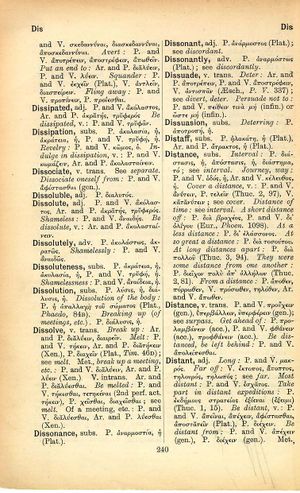dissuade: Difference between revisions
From LSJ
ὁ δ' εὖ ἔρδων θεοὺς ἐλπίδι κυδροτέρᾳ σαίνει κέαρ → but he who does well to the gods cheers his heart with a more glorious hope
mNo edit summary |
m (Woodhouse1 replacement) |
||
| Line 1: | Line 1: | ||
{{Woodhouse1 | {{Woodhouse1 | ||
|Text=[[File:woodhouse_240.jpg|thumb|link={{filepath:woodhouse_240.jpg}}]] | |Text=[[File:woodhouse_240.jpg|thumb|link={{filepath:woodhouse_240.jpg}}]] | ||
===verb transitive=== | |||
[[deter]]: Ar. and P. [[ἀποτρέπειν]], P. and V. [[ἀποστρέφειν]], V. [[ἀντισπᾶν]] (Aesch., ''P.V.'' 337); see [[divert]], [[deter]]. | [[deter]]: [[Aristophanes|Ar.]] and [[prose|P.]] [[ἀποτρέπειν]], [[prose|P.]] and [[verse|V.]] [[ἀποστρέφειν]], [[verse|V.]] [[ἀντισπᾶν]] ([[Aeschylus|Aesch.]], ''[[prose|P.]][[verse|V.]]'' 337); see [[divert]], [[deter]]. | ||
[[persuade not to]]: P. and V. | [[persuade not to]]: [[prose|P.]] and [[verse|V.]] [[πείθειν τινὰ μή]] (infin.) or [[ὥστε μή]] (infin.). | ||
}} | }} | ||
Revision as of 09:16, 20 May 2020
English > Greek (Woodhouse)
verb transitive
deter: Ar. and P. ἀποτρέπειν, P. and V. ἀποστρέφειν, V. ἀντισπᾶν (Aesch., P.V. 337); see divert, deter.
persuade not to: P. and V. πείθειν τινὰ μή (infin.) or ὥστε μή (infin.).

